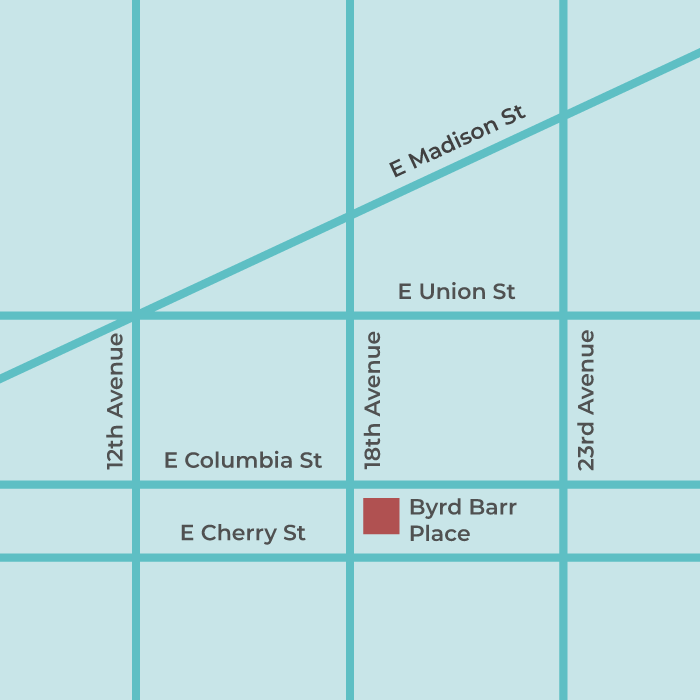Carol Richman, the “mother of CAMP” and the woman who wrote the original CAMP proposal seeking funding from the federal government through the War on Poverty legislation in 1964, endorses the agency’s name change to Centerstone. To read her initial letter to Sargent Shriver about the War on Poverty and the allocation of funds, click here. When asked to comment on the new developments within the agency, Mrs. Richman replied, “The name change isn’t something we should get excited about. The mission of CAMP, doing good work, is what we should get excited about.”
Mrs. Richman, who has been involved in social activism and civil rights her entire life, moved to Seattle in 1961 and moved into the Central Area. Barely had her feet hit the ground before she noticed the vast achievement gap among pupils at Madrona Elementary. Mrs. Richman took matters into her own hands, and with the support of the Madrona PTA, Mrs. Richman helped found the Madrona Preschool Enrichment Program in 1962. This preschool was a predecessor of the popular Headstart program, focusing on early childhood education for low-income families in order to prepare children for learning.
With a bachelor’s degree in Political Science and a master’s degree in Public Law and Government, Mrs. Richman was expertly in-tune with the pulse in Washington, D.C. An active member of the Central Area Community Council and the Central Area Citizens’ Committee for Economic Opportunity, Mrs. Richman decided to strike while the iron was hot and crafted a proposal for an agency that would prompt citizens to action and social organization within the Central Area. Out of this idea grew the agency that became the Central Area Motivation Program or CAMP, the name originally coined by Lillian Gideon, a member of the Central Area Community Council.
In its founding documents, CAMP proposed to be an agency of social change and organization. Armed with a long name and an idealistic vision, the agency was forced to reevaluate its purpose when confronted with the stark reality of life in the Central Area in the 1960s. When the block workers went door to door, attempting to motivate Central Area residents with their call to action, they were confronted with a very different reality. Instead of an army of ready participants, the block workers found lives in disarray and families needing intensive case management and social services. The Central Area was suffering a huge economic downturn during the 1960s, with discriminatory zoning laws and employment policies contributing to over 40% unemployment in the African American community. What the block workers encountered were families more interested in ensuring their basic survival than in participating in any social movements.
Like any responsive agency seeking to meet the needs of its community, the Central Area Motivation Program quickly developed programs to meet some of the basic needs of its residents, including a daycare, job training, after school study centers, programs to bring arts to the youth, African American history curriculum, and area beautification projects, just to name a few of the agency’s many undertakings. But in this process of adapting to meet the needs of the community, in answering their call for help, CAMP ceased to be a motivator for social action before it had even begun. While the focus of the agency strayed from its founding days, the name held on for 48 more years.
“Do people even think about what the Central Area Motivation Program means?” Carol Richman, the “mother of CAMP,” asked in September 2012. “If they thought about it, they would understand that this agency never did what its name said it would do, which was to motivate people…[That being said] I’m very proud of what became of CAMP. It’s doing a good job adjusting to the needs of the community.”
Today Centerstone offers a variety of basic needs services for low-income families throughout the Central Area and the city of Seattle, including energy assistance, housing assistance, a food bank, and financial education courses. Centerstone has embraced its reality, as a basic needs social service agency for low-income families and individuals, while hoping to return to some of its original purposing through advocacy and education. Today Centerstone works to help people help themselves and each other as they move from poverty to self-sufficiency through programs and advocacy.
Centerstone is not the motivator here, but the helping hand to a better future. “I think that CAMP succeeded because it still exists,” remarked Mrs. Richman when reflecting on the agency’s evolution over the last 48 years. “It serves its community and helps those who need it. That is success.”
For more information on the history of the Central Area and the African American experience in Seattle during the 1960s, please refer to Seattle in Black and White: The Congress of Racial Equality and the Fight for Equal Opportunity (2011) by Joan Singler, Jean Burning, Bettylou Valentine, and Maid Adams.

